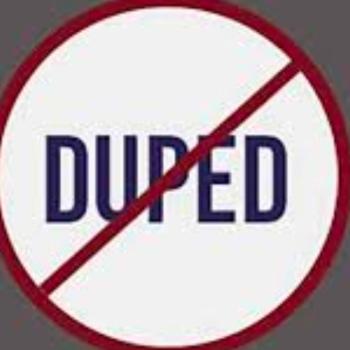
It is critical to understand the baggage (if I can call it that) that we bring to the table. Whether it is a discussion of politics, matters of science, ethics, or issues that confront our daily lives, the fact of the matter is that we all approach these topics or decisions with a prior set of assumptions, and these assumptions often radically affect what we are even willing to believe or do.
NB: I know that I am in the middle of a series of posts on the Beast and the book of Revelation. I will return to that series in a few months. As the saying goes, “we interrupt this series to bring you a special bulletin!”
What is a worldview and why does it matter?
I prefer to define a worldview as, “a set of assumptions that we hold to which affect everything we do and believe.” Another way of saying it is: a worldview is a set of assumptions through which we view the world!
For example, if we see a homeless person asking for help, what do we do? The fact is that most of us have already predetermined, to some extent, whether or not we might be willing to assist them. Some have predetermined for various reasons to never help a beggar. There is nothing to consider. Some have determined to always help: now they need to see if they have anything to offer.
Sure, we might evaluate each situation differently. But we are not blank slates.
As we consider each situation, we do so through the lens of our prior set of assumptions.
Everyone has a worldview.
The fact is that everyone has a starting point: a prior set of convictions through which we filter information. There is nothing wrong with this. It is how we see the world. It is, in fact, necessary.
After all, if we didn’t have any prior assumptions, then we would have no basis for filtering information and we would be paralyzed anytime a decision came our way—such as, “do you want to get something to eat?”
This means that when we come to topics or issues that we have never heard of, or given much time or attention to, our process of discerning begins by mentally examining the information and trying to compartmentalize it. That is, we immediately take the new information and begin to figure out how this fits or doesn’t fit with our already-held convictions.
Objectivity
Ever heard someone say, “I’m going to objectively evaluate something and make up my own mind”? Sorry to say it, but to some extent, this is not really possible.
NB: I don’t want to quibble about trivial matters, so I will concede at this point that it is conceivable that one may be “objective” when it comes to certain trivial matters—even though I don’t think it is true.
The point is that we approach everything with a set of assumptions. Such assumptions are sometimes hidden and not even apparent to us. They are such a part of what we believe and do that we often do not recognize them.
Again, I am not saying this is bad. It is what it means to be human.
What is bad is when we are not willing to recognize them. What is bad is when we are not willing to put them on the table and question them.
Being unwilling to evaluate our convictions assumes that we know they are absolutely true. The sad part is that when we are not willing to evaluate them, we have deified ourselves. We have made ourselves the arbiters of truth. In effect, even God cannot change our minds. (though we all believe that God can change our minds, the fact is that this can only happen if we first are willing to be open to the truth).
For example, suppose you are at a Superbowl party (because everyone loves sports) and your team is playing—or maybe the team you bet $50 on is playing—and with no time on the clock, one of the teams score a TD to take the lead and win the game. You are either elated or weeping—depending on which team scored.
You then notice that the officials are huddling and discussing whether or not there was a foul on the offense. If so, no TD, and the game is over.
So, was there a foul?
Now, you might want to assert from your ivory tower, “well, I need to see the replay.” But we all know that our opinion on whether or not there was a foul is largely, if not absolutely, dependent on which team we are rooting for.
NB: for all our Raiders fans out there: it was an incomplete pass. The tuck rule is a rule. This is not an opinion but a fact. Go Pats!!
Can we even be objective?
The answer to this question is simple: “no.”
But this doesn’t mean that we shouldn’t try. We should absolutely try! Always!
NB: as a Christian, I would say that we must always be humble before the Lord and allow the Spirit to help us in the process of discerning. Of course, this leads to a significant danger: namely, Christians who are absolutely confident that the Lord told them “x.” This may be true. But it is also true that you might be mistaken. Saul of Tarsus (who would later become the apostle Paul) was certainly convinced that he needed to do everything in his power to punish the early Christians. Then Jesus appeared to him, blinded him, and sent him to Damascus. Saul was wrong.
The fact is that we too often go into a discussion (and matters of religion and politics bring out the really ugly side of this) with certain assumptions. And we often do so with the intent of proving that those assumptions are right; or at least that the “other’s” assumptions are wrong.
Our desire (or shall I say “need”) to prove ourselves correct influences where we are even willing to go in order to learn more about a given topic. And it influences what we are willing to believe or not believe.
At the end of the day, we then pontificate (that is what a Pope does) and declare that such and such is true or false, and here is the evidence. When challenged we ardently defend our convictions with the plethora of data we accumulated.
But have we honestly looked at the evidence? Did we approach the evidence with a willingness to consider the possibility that we might be wrong?
Jesus is the Truth
As a Christian, it is my deep conviction (yes, it is a prior assumption that I firmly believe is true) that we should always be in a learning posture.
After all, I believe that “the truth will make you free” (John 8:32).
I also believe that Jesus is “the way, and the truth, and the life” (John 14:6).
Now, if Jesus is the truth, then all truth leads to Him. And either directly or indirectly all truth comes from Him and points us to Him.
If our goal is to become more like Jesus (Col 1:28), then our aim in life is to pursue the truth. But we can only do so if we are willing to have an open mind: that is, we must be willing to admit that we could be wrong.
It is my conviction that Christians should be the most open-minded of all persons.
In fact, I would contend that the path to Christlikeness begins with a humble acknowledgment—which comes by relying on the Spirit—that Jesus is the source of truth (of course, salvation is more encompassing than a mere belief) and it is then characterized by a life-long pursuit of the truth.
NB: In saying this, I in no way intend to deny the essential role of the Holy Spirit in this entire process. Neither do I intend to suggest that the possession of the truth alone is sufficient. Christlikeness is the result of a person’s character which endeavors to live in accord with the truth. Hence, the preeminence of humility!
Next, we must ask: What sort of things influence our worldview? This will be the subject of my next post.
Our goal is to keep these posts free of charge. I do not intend to ever hide them behind a paywall. I can only do this if those of you who have been blessed by them and can afford to give ($5, $10, $25, or more/month) do so. You can give a tax-deductible contribution by following this link.
Please share this post and let others know about determinetruth.
If you wish to view this blog on your smartphone through the Determinetruth app simply download the “tithe.ly church” app on your smartphone and insert “determinetruth” as the church name you wish to follow. Once it is loaded, simply click on the “blog” icon and it will automatically load.
If you would like to have Rob speak at your church or organization in person or via zoom, please let us know by filling out the contact info on the Contact me tab on this site.
Remember that our friends at Hearts & Minds, an independent bookstore in central Pennsylvania, have offered to give our listeners a 20% off on nearly anything ordered. Just mention Determinetruth and they will get back to you promptly with personalized service like you rarely see these days.












